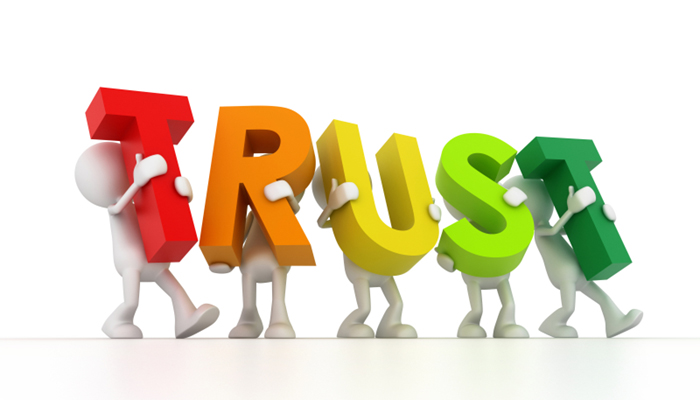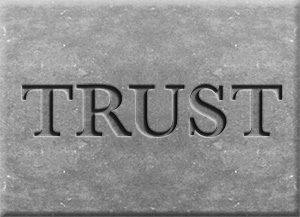In my last article we talked about the importance of self-trust in your ability to lead others. If you don’t trust yourself, how can you expect others to trust you? Now we’ll change our focus to trusting relationships.
Has this ever happened to you?
You trust someone to watch your kids but you wouldn’t trust them to drive your car.
You found great value in the ideas and wisdom (book smarts) of a person but would never think to ask them to do the work because you know they would mess it up.
You love a person’s integrity and compassion but, “bless his heart”, he’s no smarter than a doorknob.
Trust
What exactly is it? Some folks would have you believe that trust is something that is quantifiable. I don’t believe that to be true because it wouldn’t be just one number or measurement. I don’t think you could ever quantify it in a few thousand numbers or measurements. In order for trust to be quantifiable, it would have to be logical. We would have to be able to apply a system to it. Trust in not logical. Let’s take a look at what I mean…
Commonalities
Imagine a couple from San Francisco are traveling to Rome. While in their hotel they meet another couple from New York City who are visiting the city for the first time. They immediately “trust” one another because they are both Americans in this foreign land. The NYC couple recommends a restaurant that they had dinner at the night before. They loved it. The SF couple takes down the address. Then, while out walking through town, the SF couple meets a native Italian. This Italian man was born and raised in Rome… has lived there all of his life and loves his city. He suggests a great restaurant that is off the beaten path that he says is loved by the locals. Whose recommendation will the San Francisco couple trust?
Logic would tell you that the native Italian guy would know the area and the restaurants the best. However, the couple will most likely take the “trusted” recommendation of their fellow Americans.
Is that logical? Why would you trust a stranger from NYC who doesn’t really know much of anything about the area over someone who has intimate knowledge of the area. You might say because the Italian guy might be a shyster trying to get you to try his family’s restaurant. But, really what are the possibilities of that? Also, so what? Maybe his mom is the “chef” and the best Italian cook that he knows… and he knows a LOT of Italian cooks!! The NYC couple has only been in the city for one night and liked that ONE restaurant that they tried. The SF couple may have completely different tastes… but we trust people who are like us. We trust people who have something in common with us… that’s not logical.
Trust is a Feeling
Trust is a feeling that comes from common beliefs and values, common experiences, and common traits and characteristics. These commonalities lead us to have confidence and have the assumption that those similar to us will support us.
So why is it that you may trust someone to watch your children but not drive your car? With this new information you may be able to explain it. You may know that they have similar beliefs and values around children but not around cars or personal property. You may trust someone’s heart and intentions as these would be similar to yours. However, you may not trust their knowledge and ability to execute because they don’t have common beliefs, values or experience around that aspect of life.
One important ingredient to trust is commonalities. But it’s not the only thing.
Safety
When we feel safe, trust will emerge. The opposite is also true. When you don’t feel safe, it’s incredibly difficult if not impossible to trust. Take the gate agent who berates a guy for trying to board the plane in the wrong boarding group. She points at the number on his boarding pass, the number on the “Now Boarding” sign, and then shoos him away to the end of the line. If you have the courage to ask her why she treated him like that you would hear something like “If I don’t follow the rules, I could get into trouble or lose my job.” Does this woman feel safe in her job? No. Her leaders have created an environment where she doesn’t feel trusted to make the right decisions. Rather than using the rules as a guideline, she uses them as a weapon or a shield. Why? Because she doesn’t feel safe. She believes that her leaders don’t trust her so she, in turn, does not trust them.
Look at what is happening in our society today.
Leaders are creating DISTRUST.
How? Look at what we are told to focus on. … DIVERSITY.
 One of my pet peeves is DIVERSITY training. What does this focus on? It focuses us on what makes us different from others. DIVERSITY comes from the same root as DIVERSION. We, as human beings, have far more in COMMON with one another than we have not in common with one another.
One of my pet peeves is DIVERSITY training. What does this focus on? It focuses us on what makes us different from others. DIVERSITY comes from the same root as DIVERSION. We, as human beings, have far more in COMMON with one another than we have not in common with one another.
- Which one of us does not bleed when they are cut?
- Who among us does not grieve the loss of a child or loved one?
- Who is it that does not thirst for water or get hungry for food?
When will we stop focusing on what makes us different?
I hear people say that diversity training is so that we don’t offend others. What?!? If something I do offends you, please come and tell me. Most people on the planet would want to know and correct their behavior. However, we’re taught not to confront others about their behavior – after all it might hurt someone’s feelings. Instead, we’ll get someone in HR or in public office who doesn’t even know us or the other party to write a rule or a law that prohibits and inhibits people… when a discussion could probably do the trick.
Eleanor Roosevelt once said “No one can make you feel inferior without your permission.” I believe no one can offend you without your permission. Now, I’m not saying that people don’t act in ways that are offensive. We all do that. What I’m saying is that we don’t have to be offended by it… especially if we focus on what we have in COMMON with the offender rather than point out of the things that make us different.
Okay, that’s the end of my little rant for today. I’d love to hear your thoughts… Now on to the conclusion of this article.
Leaders create a safe environment focused on COMMONALITIES and common goals.
A leader is called a leader because they choose to go first. A leader must extend trust first before signs are offered that they should… even when safety isn’t guaranteed. A leader must be willing to express empathy before anyone else. Why?
The natural response to extending safety and empathy is trust. When a leader expresses empathy toward another human being, they are telling that person that they see them as a human being… a unique, living soul. When you see people as human beings first and human doings second, you are rewarded with trust and loyalty from your followers. Does this happen overnight? Nope. But it will happen.
Trust is not mechanical. There aren’t 15 foolproof steps to becoming trusted. Trust is intrinsic and requires sacrificing for another. Leaders will risk this investment, this sacrifice… they will risk extending trust before anyone else does because they know that the rewards are worth it.
So, take a look at your relationships. Are they filled with trust? If so, celebrate those relationships and celebrate the trust. You are doing good things in your life and the lives of others.
If you have relationships that are not trustful, take a look at the 3 areas we just discussed. Ask yourself these questions:
- What are the commonalities? Do we have common beliefs and values, common experiences, and common traits and characteristics?
- How can a create a safer environment? What actions and behaviors do I need to express to let them know that they are safe with me?
- Am I extending trust? Am I being a leader or waiting for someone to earn or deserve my trust before extending it to them?
Remember, trust is a feeling. It’s an emotion that is incredibly powerful and a natural part of human relations. If you want to have a trusting relationship or a trusting work environment, you must do the work. You also must allow emotions to be a part of the environment. Without emotion, you can’t feel the trust.
What are your thoughts? How does trust impact your work life and your personal life? I’d love to hear from you below. Please take a minute to share your perspectives with us.

